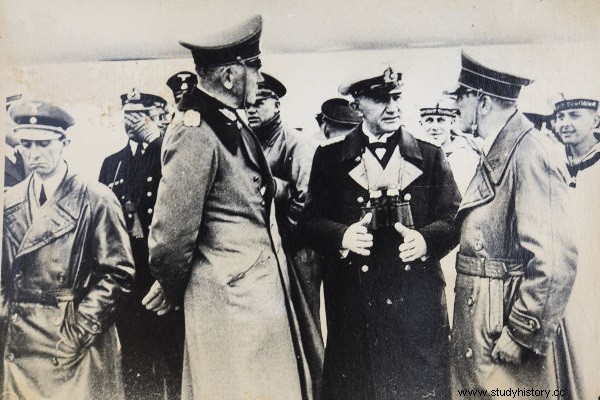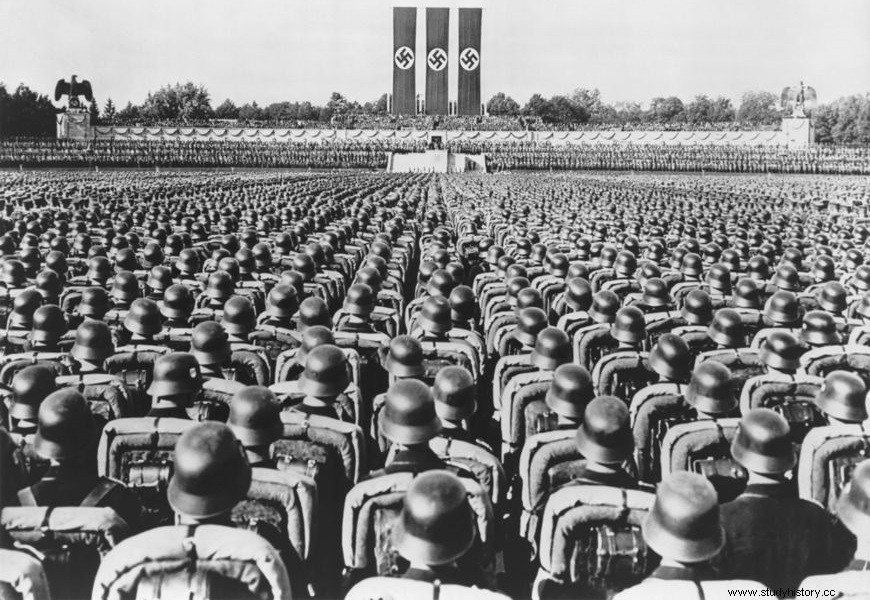Joseph Goebbels he was one of the great names of Nazism. He held the post of Minister of Propaganda and he was responsible for all the spread of the political ideology that manipulated the German population during the 1930s. He was also heavily involved in anti-Semitism, which resulted in the Holocaust — genocide that killed six million people.
He joined Nazism in the 1920s and rose quickly through the ranks of the party because of his good rhetoric. When approaching Hitler, he encouraged the cult of the personality of the Nazi leader and also the persecution of opponents, even using violent methods. He committed suicide with Germany's defeat in World War II.
Login also :Nazi eugenics - the concept of “master race” that marked German Nazism
Early Years
Paul Joseph Goebbels was born in Rheydt, Germany, on October 29, 1897. He was the son of Fritz Goebbels , a man who worked in a candle factory, and Katharina Odenhausen , who worked as a maid on a property in the countryside. Goebbels' family background was that of a humble daughter who survived from manual labor and hardship.
Goebbels' parents had a total of six children , of which he was the fourth to be born. His siblings were:Konrad, Hans, Maria (died at a few months old), Elisabeth and Maria. The health problems they were also something that marked his childhood, especially because of the deformity he had in one of his feet and that caused him some problems at school.
After completing high school, Goebbels entered higher education. He wanted to study medicine, but ended up enrolling in German and History at University of Bonn , in 1917. Before that, he had lived a great frustration:his deformed foot did not allow him to enlist in the war.
In 1921, Goebbels obtained the title of PhD in Philosophy and Romantic Literature from the University of Heidelberg . So he tried to start his professional career and pursue a literary career, but he was not very successful. He even published articles in Rheydt's newspaper and also gave private lessons to make ends meet.
From the year 1923, Goebbels began to work in a bank in the city of Cologne. At that time, he had already embraced the ultranationalist ideas and anti-Semitic that poisoned German society. The defeat in the First World War was the propitious scenario for this, as conspiracy theories began to emerge in order to explain the German failure.
Ideas that the German race needed to be purified, that the Jews were responsible for Germany's downfall, and that the defeat in the war had been part of a plot, were very common in that era. period, and Goebbels embraced them. His growing anti-Semitism is exemplified by historian Peter Longerich in showing that he recorded losing his enchantment with a young woman he was dating (Else Janke) because she was Jewish | 1 |.
Goebbels' shift towards ultranationalist and anti-Semitic ideas is explained by historian Richard J. Evans as a possible consequence of the months he spent in Munich (between 1919-1920), the great center of the German extreme right in the post-First World War. The more Goebbels immersed himself in this kind of ideal, the closer he got to Nazism.
Entry Nazism

Germany's political landscape during the 1920s was marked by the emergence of a series of extreme right-wing parties, among which was the Nazi Party. Goebbels had contact with ultranationalist parties at the beginning of this decade, and the period 1923-1924 is considered to be was crucial in his definition of culture and politics.
By mid-1923, there were already records of Goebbels declaring some admiration for Hitler. Historians show that Goebbels had a certain predisposition to look for a leader he could be inspired by since his university period, and, having a narcissistic personality, he constantly sought recognition from this leader. On April 4, 1924, Goebbels officially joined the Nazi Party.
Goebbels dedicated himself to developing the Nazi Party in his hometown region of Rheydt. In this effort he acted to promote candidates in the local election and devoted himself to the production of articles and speeches influenced by Nazi ideology. Goebbels' rhetorical skills were so good that Hitler himself invited him to speak in Munich.
His work in the production of articles and his growth within Nazism earned him an appointment:director of a newspaper called Völkische Freheit , with an ultranationalist bias. He took over the direction in October 1924, and the first edition of this newspaper had texts written by himself.
In 1926, Goebbels was invited by Hitler himself to command the Nazi Party in Berlin , capital of Germany. This was the result of the rapprochement that took place between the two after Goebbels joined the party. In 1928, Goebbels was elected deputy in the Reichstag , the German Parliament. This made him one of the most important members of Nazism in Germany.
Login also :Einsatzgruppen - Nazi extermination groups
Propaganda Minister

In 1933, Adolf Hitler took over as chancellor of the Germany, bringing the Nazis to power in the country. Goebbels had been one of the greats who worked to promote Hitler during the 1932 presidential election. Hitler had been defeated by Hindenburg, but in early 1933 he was named chancellor of the country.
Goebbels was awarded the Ministry of Propaganda , since he took over on March 14, 1933. Hitler's objective, when putting him into office, was to impose Nazi control over all cultural and intellectual production that existed in Germany, and thus promote a true revolution cultural in the country.
Goebbels became largely responsible for the propaganda of the Nazi regime and was very successful in this role. He managed to convince a considerable part of Germany to support Nazism, drawing a great popular mobilization in its defense. In addition, he managed to infuse anti-Semitism, intensifying the persecution against Jews.
Goebbels was behind thesuppression of access to culture and went on to persecute artists and intellectuals that did not fit the Nazi ideal. One of his first measures, in this sense, was to promote the burning of books , in May 1933. In this burning, books by Einstein, Erich Maria Remarque, Thomas Mann, Freud, among others were set on fire.
The cultural revolution advocated and implemented under the leadership of Goebbels aimed to infuse Nazi ideology and deepen popular support for it. For this, the younger generations were the target of intense ideological indoctrination that started from basic education. The Hitler Youth , a group of young people who supported Hitler, was formed by those who had been initiated into Nazi indoctrination at the age of six.
Goebbels, in his advertisements, conveyed Nazism through a profoundly positive image, in order to win the support of the population. He urged people to actively participate in the regime, and that was a fundamental characteristic of Nazism:the mobilization of the people . To this end, gigantic rallies were held as a way of reinforcing the values of Nazism. Calling the population for boycotts and attacks against Jews was another way of keeping the people engaged with Nazi actions.
The Minister of Propaganda was also responsible for the exaltation of Hitler's image and for his personality cult. He popularized the expression “Heil Hitler ” , which means "Hail Hitler", as a salute from the Nazis. Goebbels truly admired Hitler, and because of that, he created this cult, which was an essential part of the regime.
See also: Brazil in the Second World War – entry and action
Goebbels and Anti-Semitism
Goebbels' role in the development of anti-Semitism in Germany in the 1930s was extensive. One of his first actions, in this regard, was to announce the Judenboykott — law that determined the boycott to Jewish commercial establishments. This boycott lasted one day and inaugurated the persecution of Jews in Germany under the Nazis.
Anti-Semitism was one of Goebbels' main initiatives as a way of bolstering public support for Nazism. When the government's situation worsened, Goebbels encouraged violence against Jews as a way of channeling popular dissatisfaction . This strategy worked very well, as anti-Semitism was very strong among the older generations who had suffered from the consequences of defeat in the First World War.
Goebbels had a very vague idea of anti-Semitism, so he used it against all those who opposed the Nazi regime. He was behind Nazism's most violent actions against Jews , as was the case of the Crystal Night. This widespread attack on Jews, known as the pogrom , took place in November 1938 and began the imprisonment of Jews in concentration camps.
Read more :Munich Conference - the outcome of the diplomatic question between Germany and Czechoslovakia
World War II
Germany started World War II with the invasion of Poland , September 1939. Things went well for the Germans until the invasion of the Soviet Union, as the defeat at Stalingrad severely hampered the German war effort. As the Germans were defeated in the war, Goebbels reinforced his rhetoric against the Jews.
Goebbels' appeal was for a final solution regarding the Jews to be taken, and he was largely responsible for convincing Hitler that the extermination of the Jews should be total and carried out. during the war. Once convinced, Hitler, Heydrich and Himmler engineered the Solution End —plan that resulted in the Holocaust .
War victory became a minor cause compared to the genocide of the Jews. In any case, the loss in crucial battles, such as Stalingrad and Kursk, added to the assassination attempt on Hitler, in July 1944, made Goebbels summon the population to an all-out war against the Allies.
Death
In the last weeks of the war, the Nazi leadership hid in a bunker underground in Berlin. Among those in hiding were Hitler and Goebbels. On April 30, Hitler committed suicide along with his wife, Eva Hitler. Before that, he ordered Goebbels to flee Germany, but he disobeyed the order.
Before committing suicide, Hitler appointed Admiral Karl Dönitz to take command of the country. On the 1st of May, Joseph Goebbels and his wife, Magda Goebbels , decided to kill their children and then commit suicide. So they did. That day, Goebbels and his wife administered doses of acid cyanide on her six children, leading to their death. Then he and his wife ingested the same ingredient.
Note:
|1| LONGERICH, Peter. Joseph Goebbels :a biography. To access, click here.
Image credits
[1] IgorGolovniov and Shutterstock
[2] Everett Historical and Shutterstock
